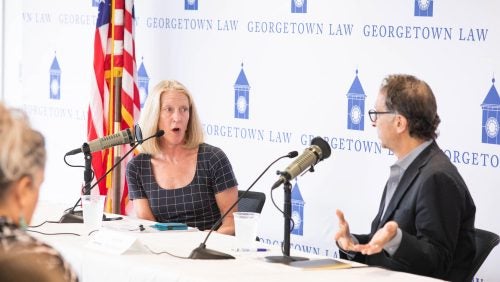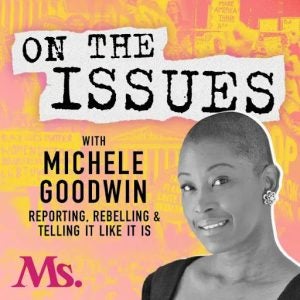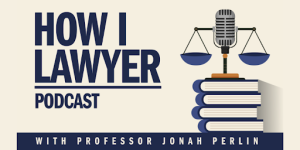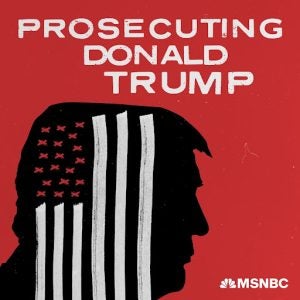Georgetown Law’s Podcasting Professors Hit Record
November 1, 2023

(L-R) Professor Mary McCord and co-host Andrew Weissman hosted a live taping of their podcast, "Prosecuting Donald Trump" at Georgetown Law
In recent years, several Georgetown Law professors have entered the world of podcasting, offering sophisticated legal analysis and insight with no tuition required.
On MSNBC’s “Prosecuting Donald Trump,” Professor Mary McCord, L’90, Executive Director of the Institute for Constitutional Advocacy and Protection and her co-host Andrew Weissman, a fellow former federal prosecutor, explain the latest developments in the legal cases against former President Donald Trump. Legal Writing and Practice Professor Jonah Perlin, L’12, chats with lawyers about their niche legal areas on his “How I Lawyer Podcast.” And Professor Michele Goodwin, who recently joined the Law Center as co-faculty director of the O’Neill Institute for National and Global Health Law, hosts Ms. Magazine’s “On The Issues with Michele Goodwin,” where she and her guests explore the intersection of the law and equality.
We spoke with each professor-podcaster to learn more about their podcast production process, favorite moments and advice for law students looking to start their own legal storytelling journeys.
Professor Michele Goodwin: ‘Reporting, Rebelling & Telling It Like It Is’

Goodwin addresses issues at the center of American democracy, law and policy, as well as those concerns not often discussed in mainstream media. Working with a team from Ms. Magazine, Goodwin is constantly looking for ways to educate the public on matters affecting marginalized communities.
While she has interviewed many well-known politicians, journalists and experts, one episode that Goodwin recalls as especially powerful was with Sue Ellen Allen, a formerly incarcerated woman who founded a nonprofit to support women re-entering society after prison and was a 2016 State of the Union Address guest of President Obama. Goodwin was moved by Allen’s experiences with breast cancer while incarcerated, which highlighted the health inequities incarcerated women face.
Goodwin says she hopes her podcast helps to lift up women and render their concerns and analysis visible. She explained that her podcast seeks to inform the public and reach listeners who are hungry for nuance in the delivery of news. “When people are able to look back, what is it that they are able to hear?” she asked. She enthusiastically encourages others to launch podcasts, even if the audience may be small. “What makes a successful podcast? One might say it’s a certain volume of listeners, but maybe whoever is listening is getting something out of the podcast,” she said. “Go for it, do it!”
Professor Jonah Perlin: ‘Not a Deposition, A Conversation’
 Perlin created his “How I Lawyer Podcast” during the COVID-19 pandemic. Wanting to have a creative outlet and provide extra support to his remote students, Perlin produced 50 interview-style episodes in 2021, and is now at episode 121 and counting. He has an editor to help prepare the podcast and is planning to hire a part-time producer in hopes of reclaiming some of the personal time he spends each week working on the project.
Perlin created his “How I Lawyer Podcast” during the COVID-19 pandemic. Wanting to have a creative outlet and provide extra support to his remote students, Perlin produced 50 interview-style episodes in 2021, and is now at episode 121 and counting. He has an editor to help prepare the podcast and is planning to hire a part-time producer in hopes of reclaiming some of the personal time he spends each week working on the project.
“My goal is to use this internet-based medium of podcasting to make our profession more transparent and diverse, and get rid of some of the secret curriculum to being and becoming a lawyer,” Perlin says. He opens each episode by asking his guests questions most law students would want to ask a practitioner, encouraging them to share their personal experiences in the profession. A former litigator, he added, “It’s not a deposition, it’s a conversation.”
Perlin is proud of the impact his podcast has had on his listeners. “I’ve had several students who have told me they started listening to the podcast when they were seniors in college and it made them decide they want to go to law school,” he said.
His advice for potential podcasters? “You don’t need permission from anyone to start a podcast,” he said. “Our profession can become stronger and more transparent by people sharing content publicly.”
Professor Mary McCord: The Insider Perspective
 Preparing for her podcast makes McCord feel like a trial prosecutor again, she says. “You’ve got to be nimble, ready to adjust when things change.” There have been times mid-recording when breaking news has forced the conversation to pivot. McCord notes that “Prosecuting Donald Trump” is not only delivering Trump-related news, but providing a unique federal prosecutor perspective.
Preparing for her podcast makes McCord feel like a trial prosecutor again, she says. “You’ve got to be nimble, ready to adjust when things change.” There have been times mid-recording when breaking news has forced the conversation to pivot. McCord notes that “Prosecuting Donald Trump” is not only delivering Trump-related news, but providing a unique federal prosecutor perspective.
McCord and Weissman, who teaches at NYU Law, have decades of Justice Department experience between them. In each episode, they alternate between explaining legal terminology the way a professor would and sharing anecdotes from some of the high-profile cases they prosecuted in the past.
McCord says she hopes listeners will have a better understanding of not only the legal issues involved in these investigations, but also why these cases matter. “They are important for our democracy, they’re important for the rule of law, they’re important to see there is accountability for violations of the law,” McCord adds.
Recently, MSNBC came to Georgetown Law’s campus for a live recording of the podcast. Students had the opportunity to ask the cohosts questions on topics including jury selection, the possibility of a televised trial and presidential power.
McCord advises would-be podcasters to survey the marketplace before making any moves: “Take a good hard look at what is already out there and what you have to add that would be different or complementary. Bring to light legal issues that aren’t making the headlines, but that are still important.”
Once you’ve checked out our professors’ podcasts, here are some others they recommend for keeping up with legal news and analysis:
LawFare
JustSecurity
Strict Scrutiny
The Daily
Throughline
Torn Apart
Personal Jurisdiction
The Portia Project
The Texas Appellate Lawyers Podcast